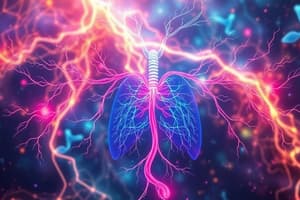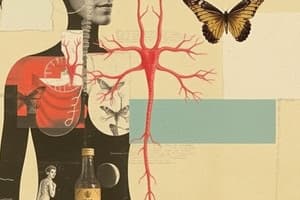Podcast
Questions and Answers
The mechanisms by which an organism maintains a stable internal environment and responds to external stimuli are called ______.
The mechanisms by which an organism maintains a stable internal environment and responds to external stimuli are called ______.
Control and Coordination
The ______ is responsible for producing thyroxine.
The ______ is responsible for producing thyroxine.
Thyroid Gland
Hypersecretion refers to the excessive production of a ______.
Hypersecretion refers to the excessive production of a ______.
hormone
The ______ are located on top of the kidneys.
The ______ are located on top of the kidneys.
Cretinism is caused by hypothyroidism in ______.
Cretinism is caused by hypothyroidism in ______.
The adrenal medulla secretes hormones such as ______ that prepare the body for 'fight or flight' responses.
The adrenal medulla secretes hormones such as ______ that prepare the body for 'fight or flight' responses.
The pituitary gland is often referred to as the ______ gland.
The pituitary gland is often referred to as the ______ gland.
Water and mineral balance in the body is regulated by ______ secreted by the adrenal cortex.
Water and mineral balance in the body is regulated by ______ secreted by the adrenal cortex.
Flashcards
What is homeostasis?
What is homeostasis?
The maintenance of a stable internal environment despite external changes.
What is the endocrine system?
What is the endocrine system?
A system of glands that secrete hormones directly into the bloodstream.
What are hormones?
What are hormones?
Chemical messengers produced by endocrine glands and circulate in the blood to influence the activity of target organs.
What is the thyroid gland?
What is the thyroid gland?
Signup and view all the flashcards
What is thyroxine?
What is thyroxine?
Signup and view all the flashcards
What are the adrenal glands?
What are the adrenal glands?
Signup and view all the flashcards
What is the pituitary gland?
What is the pituitary gland?
Signup and view all the flashcards
What are tropic hormones?
What are tropic hormones?
Signup and view all the flashcards
Study Notes
Endocrine System Overview
- Control and Coordination: Organisms maintain stability and react to stimuli through complex mechanisms.
- Homeostasis: Maintaining a consistent internal environment despite external changes.
- Chemical Control: Hormonal regulation by endocrine glands.
- Neural Control: Regulation via nerve impulses.
- Endocrine System: Network of glands releasing hormones directly into the bloodstream.
- Exocrine Glands: Secrete products via ducts.
- Endocrine Glands: Ductless glands releasing hormones directly into the bloodstream.
- Hormones: Chemical messengers, carried in the blood, influencing target organs.
- Pheromones: Hormones secreted externally affecting other individuals.
Thyroid Gland
- Thyroid Gland: Large neck gland producing thyroxine.
- Thyroxine: Hormone regulating metabolism, growth, and development.
- Hypersecretion: Excessive hormone production.
- Hyposecretion: Insufficient hormone production.
- Cretinism: Hypothyroidism in infancy, causing stunted growth and mental development.
- Myxedema: Hypothyroidism in adults, causing sluggish metabolism, swelling, and weight gain.
- Simple Goitre: Enlarged thyroid due to iodine deficiency.
Adrenal Glands
- Adrenal Glands: Two small glands atop the kidneys.
- Adrenal Cortex: Outer layer of adrenal glands.
- Adrenal Medulla: Inner layer of adrenal glands.
- Cortical Hormones (Corticoids): Steroid hormones regulating metabolism, water balance, mineral balance, and sexual characteristics.
- Adrenaline (Epinephrine): Hormone triggering "fight or flight" response.
- Noradrenaline (Norepinephrine): Hormone regulating blood pressure.
Pituitary Gland
- Pituitary Gland: "Master gland" controlling other endocrine glands.
- Tropic Hormones: Pituitary hormones stimulating other endocrine gland activity.
Pancreas
- Pancreas: Dual function gland (endocrine and exocrine).
- Islets of Langerhans: Pancreatic clusters of hormone-producing cells.
- Insulin: Hormone lowering blood glucose levels.
- Glucagon: Hormone raising blood glucose levels.
- Diabetes Mellitus: Disease due to insufficient insulin, causing high blood glucose.
- Hypoglycemia: Abnormally low blood glucose.
Studying That Suits You
Use AI to generate personalized quizzes and flashcards to suit your learning preferences.




